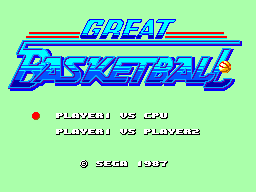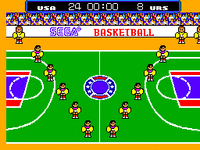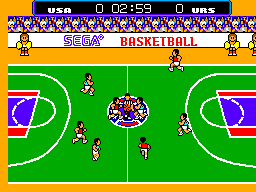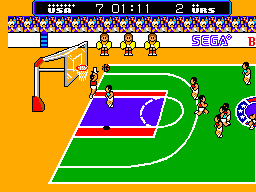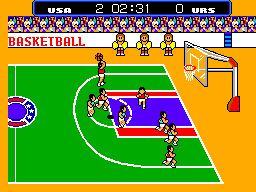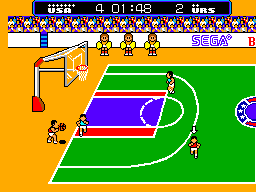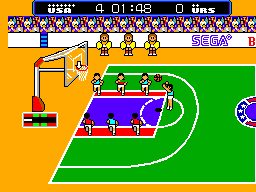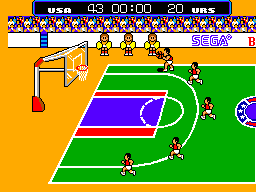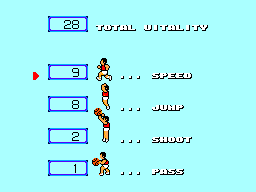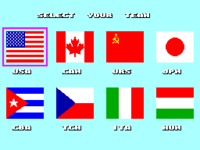Great Basketball (グレートバスケットボール), known simply as Great Basket in Brazil, is a sports game developed and published by Sega for the Sega Master System. It was released internationally as part of the Great series of sports games.
Gameplay
The game is a basketball game that can be played by one or two players. It features eight teams, representing different countries. Teams consist of five players. Games are divided into two halves, each three minutes long, with a halftime show in between. If the game is tied, a 90-second overtime period is played (and additional overtime periods are played until a team wins). In the one-player game, the player chooses a team and plays a tournament against a series of opponents (which are chosen by the player before each game). The player wins the gold medal by winning seven games in a row or loses the tournament by losing two games. In two-player games, each player chooses a different team and plays a single match against each other.
The game has multiple fouls: charging (one player runs into another), pushing (a player pushes or bumps the player with the ball), and traveling (a player jumps and lands while retaining possession of the ball). The other team gains possession of the ball when a foul is committed. The ball can also bounce out of bounds if a pass is not completed, which likewise awards possession of the ball to the other team.
|
|
Jump Ball
|
At the beginning of each half, the referee tosses the ball into the air in the middle of the court, and a player from each team jumps with  to take the ball, then tips the ball to a teammate with to take the ball, then tips the ball to a teammate with  . .
|
|
|
Defense
|
When the opposing team has possession of the ball, the team member that is closest to the ball (who is marked by a white arrow) can be moved in any direction using the D-Pad. The other team members follow automatically. The player can jump with  to try to block a shot by the opponent. A player attempts to steal the ball if near the player with the ball, though running into the other player may result in a charging or pushing foul. Team members automatically intercept passes if they are positioned in between them. Players can also try to regain possession of the ball by catching rebounds. to try to block a shot by the opponent. A player attempts to steal the ball if near the player with the ball, though running into the other player may result in a charging or pushing foul. Team members automatically intercept passes if they are positioned in between them. Players can also try to regain possession of the ball by catching rebounds.
|
|
|
Offense
|
When the player's team has possession of the ball, the team member with the ball can be moved in any direction using the D-Pad. The team member dribbles automatically, and the other team members follow automatically. The player can jump with  or pass with or pass with  . During a jump, pressing . During a jump, pressing  again shoots the ball and pressing again shoots the ball and pressing  passes to a teammate. Failing to do either before landing results in a traveling foul. When passing, the ball is passed to the closest teammate that the player was last facing (who is marked by a white arrow). The pass can be intercepted by a member of the opposing team. passes to a teammate. Failing to do either before landing results in a traveling foul. When passing, the ball is passed to the closest teammate that the player was last facing (who is marked by a white arrow). The pass can be intercepted by a member of the opposing team.
When the opposing team scores or commits a foul, the other team gets possession of the ball. A team member standing on the sidelines throws the ball to the teammate marked with a white arrow with  . The arrow cycles through the members of the team. When there is no arrow above a team member, throwing the ball throws it downcourt. . The arrow cycles through the members of the team. When there is no arrow above a team member, throwing the ball throws it downcourt.
|
|
|
Free Throw
|
| If a player fouls the other team while they are shooting or commits a foul after already committing seven fouls in a half, the other team is given two free throws. The number of fouls (up to seven) is shown as crosses on top of the team name in the status area on the top of the screen.
During a free throw, an arrow moves left and right over the backboard, which determines the direction of the shot. A white meter fills and empties, which controls the touch of the shot. The player can shoot by pressing  , with the shot most likely to go in when the arrow is over the basket and the touch gauge is in the marked green area. If the player makes the first shot, the player gets a second free throw; otherwise, the ball can be rebounded by either player and the game continues. , with the shot most likely to go in when the arrow is over the basket and the touch gauge is in the marked green area. If the player makes the first shot, the player gets a second free throw; otherwise, the ball can be rebounded by either player and the game continues.
|
|
|
Winning Shot
|
| After winning a game, the winning team lines up around the three-point line, and each team member attempts a shot. The player earns one "vitality point" for every shot made and one vitality point for every point led over the opponent (that is, the winner's score minus the loser's score). These points can be spent to enhance the team's skills in four categories (Speed, Jump, Shoot, and Pass).
|
Teams
Great Basketball features eight national teams, which have different strengths. After selecting a team, the game plays an excerpt of the country's national anthem.
| Team |
Speed |
Jump |
Shoot |
Pass
|
 United States (USA) United States (USA) |
9 |
8 |
2 |
1
|
 Canada (CAN) Canada (CAN) |
7 |
7 |
4 |
2
|
 Soviet Union (URS) Soviet Union (URS) |
8 |
7 |
3 |
2
|
 Japan (JPN) Japan (JPN) |
6 |
6 |
4 |
4
|
 Cuba (CBA) Cuba (CBA) |
12 |
6 |
1 |
1
|
 Czechoslovakia (TCH) Czechoslovakia (TCH) |
3 |
5 |
7 |
5
|
 Italy (ITA) Italy (ITA) |
5 |
6 |
4 |
5
|
 Hungary (HUN) Hungary (HUN) |
2 |
7 |
6 |
5
|
Versions
Localised names
Also known as
| Language
|
Localised Name
|
English Translation
|
| English
|
Great Basketball
|
Great Basketball
|
| Portuguese (Brazil)
|
Great Basket
|
|
Magazine articles
- Main article: Great Basketball/Magazine articles.
Physical scans
| {{{{{icon}}}|L}}
|
Division by zero.
|
Based on
0 review
|
| Master System, US
|
 Cover
|
 Manual |
| Master System, EU
|
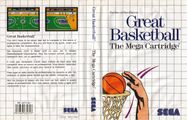 Cover
|
|
|
| Master System, EU (Sega®)
|
 Cover
|
|
|
| Master System, EU ("No Limits")
|
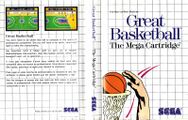 Cover
|
|
|
| Master System, BR
|
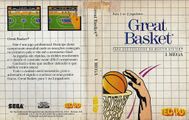 Cover
|
 Cart  Manual |
| Master System, KR
|
|
|
  Cart |
Technical information
ROM dump status
| System |
Hash |
Size |
Build Date |
Source |
Comments |
|
|
|
| ?
|
| CRC32
|
2ac001eb
|
| MD5
|
450d68460d4ae07a7cc98d36491fd4f8
|
| SHA-1
|
2fdb7ebce61e316ded27b575535d4f475c9dd822
|
|
128kB
|
|
Cartridge
|
|
|
|
|
References
- ↑ 1.0 1.1 https://sega.jp/history/hard/segamark3/software.html (Wayback Machine: 2019-06-21 03:44)
- ↑ Computer Entertainer, "December 1987" (US; 1987-12-xx), page 14
- ↑ ACE, "January 1989" (UK; 1989-xx-xx), page 166
- ↑ Complete Guide to Consoles, "Volume IV" (UK; 1990-11-xx), page 98
- ↑ The Complete Guide to Sega, "" (UK; 1991-05-xx), page 57
- ↑ Console XS, "June/July 1992" (UK; 1992-04-23), page 141
- ↑ Mean Machines Sega, "October 1992" (UK; 1992-09-xx), page 133
- ↑ Power Play, "Ausgabe 3" (DE; 1988-02-22), page 96
- ↑ S: The Sega Magazine, "August 1990" (UK; 1990-07-05), page 19
- ↑ Sega Power, "October 1991" (UK; 1991-09-05), page 57
- ↑ Sega Pro, "Christmas 1991" (UK; 1991-12-12), page 43
- ↑ Sega Pro, "April 1993" (UK; 1993-03-11), page 71
- ↑ Tilt, "Mai 1988" (FR; 1988-0x-xx), page 101
